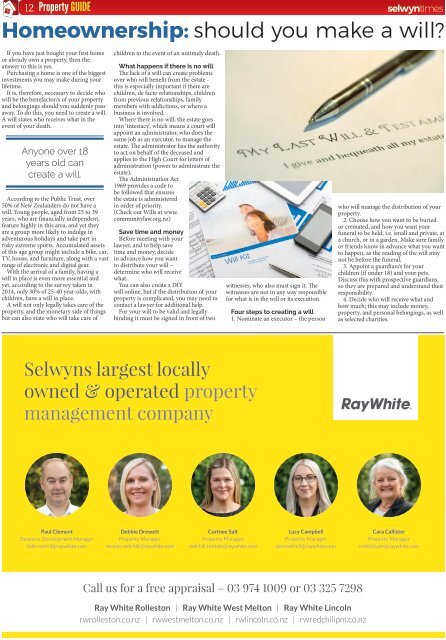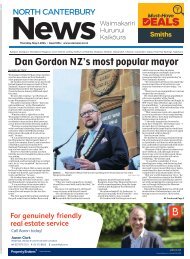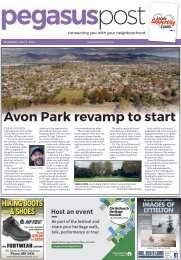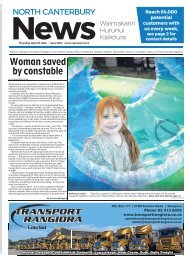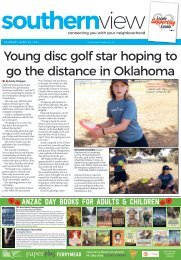You also want an ePaper? Increase the reach of your titles
YUMPU automatically turns print PDFs into web optimized ePapers that Google loves.
2<br />
12 [Edition datE]<br />
Homeownership: should you make a will?<br />
If you have just bought your first home<br />
or already own a property, then the<br />
answer to this is yes.<br />
Purchasing a home is one of the biggest<br />
investments you may make during your<br />
lifetime.<br />
It is, therefore, necessary to decide who<br />
will be the benefactor/s of your property<br />
and belongings should you suddenly pass<br />
away. To do this, you need to create a will.<br />
A will states who receives what in the<br />
event of your death.<br />
Anyone over 18<br />
years old can<br />
create a will.<br />
According to the Public Trust, over<br />
50% of New Zealanders do not have a<br />
will. Young people, aged from 25 to 39<br />
years, who are financially independent,<br />
feature highly in this area, and yet they<br />
are a group more likely to indulge in<br />
adventurous holidays and take part in<br />
risky extreme sports. Accumulated assets<br />
of this age group might include a bike, car,<br />
TV, house, and furniture, along with a vast<br />
range of electronic and digital gear.<br />
With the arrival of a family, having a<br />
will in place is even more essential and<br />
yet, according to the survey taken in<br />
2014, only 30% of 25-40 year-olds, with<br />
children, have a will in place.<br />
A will not only legally takes care of the<br />
property, and the monetary side of things<br />
but can also state who will take care of<br />
children in the event of an untimely death.<br />
What happens if there is no will<br />
The lack of a will can create problems<br />
over who will benefit from the estate -<br />
this is especially important if there are<br />
children, de facto relationships, children<br />
from previous relationships, family<br />
members with addictions, or where a<br />
business is involved.<br />
Where there is no will, the estate goes<br />
into ‘intestacy’, which means a court will<br />
appoint an administrator, who does the<br />
same job as an executor, to manage the<br />
estate. The administrator has the authority<br />
to act on behalf of the deceased and<br />
applies to the High Court for letters of<br />
administration (power to administrate the<br />
estate).<br />
The Administration Act<br />
1969 provides a code to<br />
be followed that ensures<br />
the estate is administered<br />
in order of priority.<br />
(Check out Wills at www.<br />
communitylaw.org.nz)<br />
Save time and money<br />
Before meeting with your<br />
lawyer, and to help save<br />
time and money, decide<br />
in advance how you want<br />
to distribute your will –<br />
determine who will receive<br />
what.<br />
You can also create a DIY<br />
will online, but if the distribution of your<br />
property is complicated, you may need to<br />
contact a lawyer for additional help.<br />
For your will to be valid and legally<br />
binding it must be signed in front of two<br />
witnesses, who also must sign it. The<br />
witnesses are not in any way responsible<br />
for what is in the will or its execution.<br />
Four steps to creating a will<br />
1. Nominate an executor – the person<br />
who will manage the distribution of your<br />
property.<br />
2. Choose how you want to be buried<br />
or cremated, and how you want your<br />
funeral to be held, i.e. small and private, at<br />
a church, or in a garden. Make sure family<br />
or friends know in advance what you want<br />
to happen, as the reading of the will may<br />
not be before the funeral.<br />
3. Appoint a guardian/s for your<br />
children (if under 18) and your pets.<br />
Discuss this with prospective guardians,<br />
so they are prepared and understand their<br />
responsibility.<br />
4. Decide who will receive what and<br />
how much; this may include money,<br />
property, and personal belongings, as well<br />
as selected charities.


